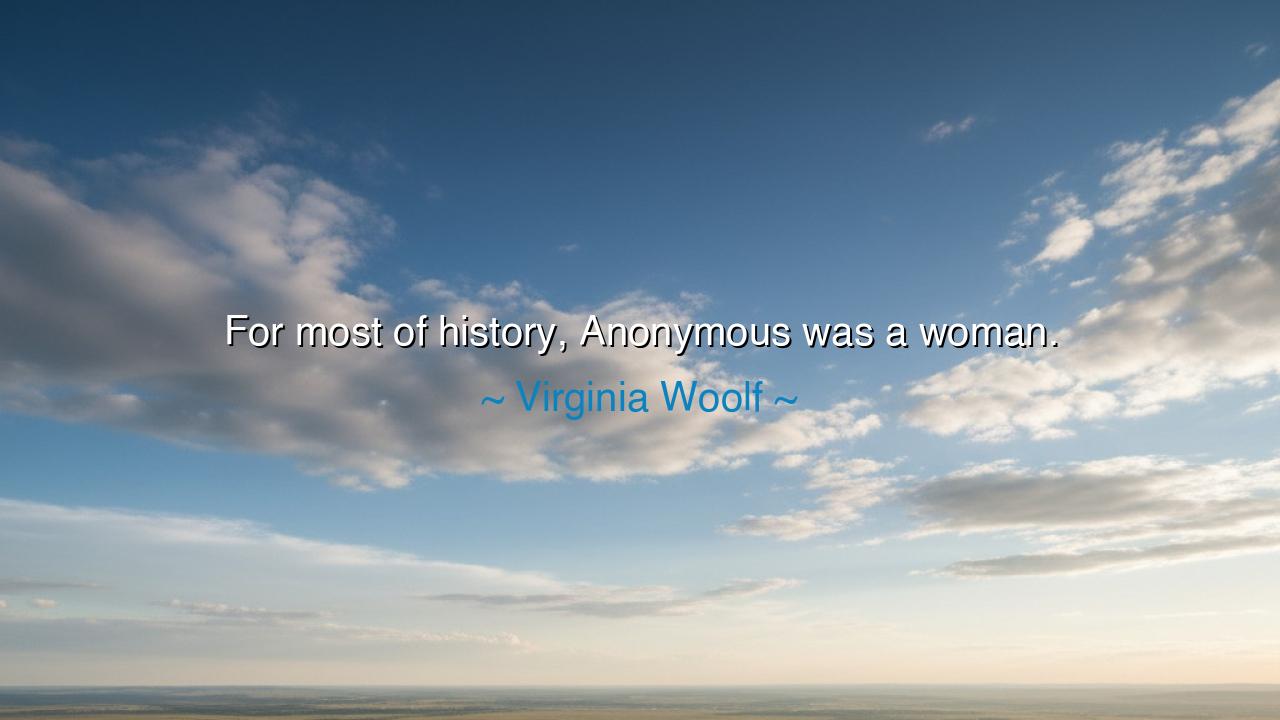
For most of history, Anonymous was a woman.






“For most of history, Anonymous was a woman.” — Thus wrote Virginia Woolf, the visionary of letters, whose pen cut through the silence of centuries. In this single line, she unveiled the sorrowful truth that half of humanity’s voice had been muted, its brilliance hidden behind the veil of anonymity. Her words are both elegy and revelation — an acknowledgment of the women who lived, created, and dreamed in darkness, denied the right to name their own genius. Through this sentence, Woolf does not merely speak of gender; she speaks of erasure, of invisibility, and of the quiet endurance of those whose gifts shaped the world, yet were never recognized by it.
To say that “Anonymous was a woman” is to reveal the cruel irony of history. For countless centuries, women’s hands wove, built, and wrote — but their names were stripped from their works. The songs sung in temples, the poems whispered in courts, the discoveries made in study and thought — so many were created by women who could not claim them. A woman’s ideas had to travel in disguise, wearing a man’s name or no name at all. And so, “Anonymous,” that eternal author, composer, and thinker, became the silent pseudonym of womanhood itself. Woolf, with the keen sorrow of a seer, looked back upon this truth and gave it voice, restoring to the forgotten their rightful dignity.
In her essay A Room of One’s Own, where this quote was born, Woolf spoke of the barriers that had long confined women’s creativity — poverty, dependency, exclusion, and the absence of freedom. To write, she said, a woman must have a room of her own and the means to sustain herself. Without independence, genius cannot breathe. She imagined what might have been if Shakespeare had a sister — equally gifted, equally inspired. That sister, denied education, forbidden from acting, silenced by ridicule, would never have written her plays. Her brilliance would have perished in obscurity. And in that imagining, Woolf revealed the tragedy of history: how many Shakespeares have we lost because they were born women?
Consider the tale of Hypatia of Alexandria, the philosopher and mathematician of the ancient world. In her time, she was renowned for wisdom and grace, a teacher to the greatest minds of her city. Yet history, written by men, nearly erased her name. Her writings are lost, her story twisted into myth. She was murdered by a mob, condemned not for her thoughts but for daring to think. How many such voices have been buried beneath the centuries? How many discoveries, how many poems, how many dreams lie hidden under the name of “Anonymous”? Woolf’s words are a gravestone for the nameless, but also a torch, calling us to remember and to restore.
Yet her message is not one of despair, but of awakening. For to name the silence is the first act of breaking it. Woolf wrote in an age when women were just beginning to reclaim their voices, to sign their own works, to step into the public realm of intellect and art. By declaring that Anonymous was a woman, she did not merely lament what was lost — she demanded that the future be different. She reminded the world that the mind has no gender, that talent belongs to no single class or sex, and that every soul deserves the freedom to create without fear. Her words are a summons to remembrance and to rebellion.
The ancient world understood that names carry power. To name a thing was to give it life; to erase a name was to condemn it to shadow. Thus, Woolf’s act of naming — of saying that Anonymous was a woman — is both restoration and resurrection. She calls the forgotten from their graves, whispering that they were not invisible, only unseen; not voiceless, only unheard. And as we remember them, we restore their place in the true history of humankind, a history that belongs not to one sex or race or class, but to all who have ever dared to create.
Let this be your lesson: when you look upon the past, do not see it as a closed book. Look instead for the hidden ink, the faint lines written between the margins. Remember that every triumph we inherit was built by many hands, some known, some nameless. Seek out the voices silenced by injustice — and give them back their names. For to honor them is not an act of pity, but of justice, and in doing so, you enrich your own soul.
And so, as Virginia Woolf teaches, the task before us is not only to remember, but to write anew — to ensure that never again will genius be buried under silence. Let no mind, no dream, no creation be lost to anonymity. Let every child, girl or boy, be taught that their voice matters, that their name has worth. For when every voice is heard, and every name remembered, then — and only then — will history at last tell the whole truth of what it means to be human.






AAdministratorAdministrator
Welcome, honored guests. Please leave a comment, we will respond soon